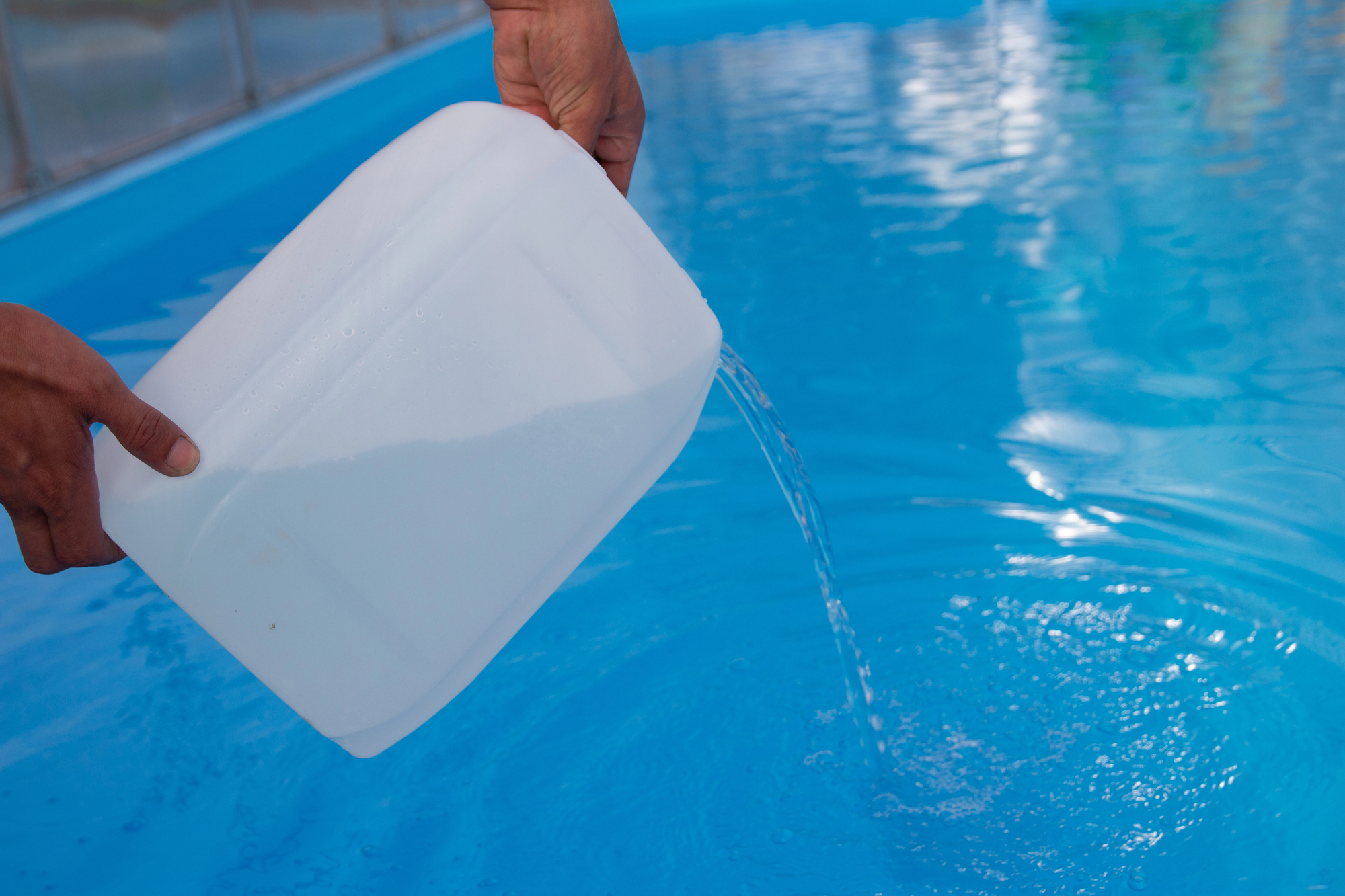What Is Muriatic Acid or Pool Acid?
Weekly swimming pool maintenance uses a variety of chemicals to help keep your pool clean and safe. One of these vital chemicals is known as “pool acid.” Pool-grade muriatic acid is a diluted version of hydrochloric acid used to clean brick and concrete. It has a lower concentration of hydrogen chloride. Muriatic acid is one of the most versatile swimming pool chemicals and is most often used to balance pH levels. Swimming pool owners should remember that muriatic acid is still an acid, and it is highly corrosive, so you should be extremely careful whenever you use it or pool acid.

Using Pool Acid as Part of Routine Swimming Pool Maintenance
A well-balanced pool environment is important for optimal water quality and preventing future complications. When your pool’s pH is above 7.8, the water becomes too alkaline, which can cause calcium buildup, increased algae blooms, cloudy water, and scaling. High alkalinity can also severely damage your pool’s filter, circulation systems, and surfaces.
Using muriatic acid is an effective and affordable solution to lower your pool’s pH and alkalinity levels. Because muriatic acid is a hazardous material, ordering online and finding pool-grade muriatic acid in local stores can be difficult. Lone Star Pool Services understands you want to quickly find a good product that won’t break the bank and sells pool-grade muriatic acid in 4-gallon cases at an affordable price.
Safety Tips for Using Muriatic Acid
Before adding muriatic acid to your swimming pool, you must take the appropriate safety measures. Muriatic acid, like any other pool chemical, can be harmful if misused and according to manufacturer directions. Exposure to acid can lead to eye damage, severe skin burns, and respiratory issues. By following these safety tips, you can prevent potential hazards.
- Always store muriatic acid in its original container and be aware of other chemicals.
- Wear appropriate protective gear, such as acid-resistant gloves and goggles.
- Always use muriatic acid in a well-ventilated area and avoid breathing fumes to minimize inhalation risks.
- Dilute muriatic acid in water before adding it to your swimming pool.
- If any muriatic acid accidentally gets on your skin, immediately wash the area with clean water.
- Keep a bucket of fresh, clean water nearby, or have a garden hose ready and within reach if any muriatic acid accidentally splashes on your skin.
- Unused muriatic acid should not be poured down the drain. Your local recycling center will be able to tell you how to properly and safely dispose of unused muriatic acid.
Adding Muriatic Acid to Your Swimming Pool
When using muriatic acid to help keep your pool’s pH levels balanced, always test your pool’s pH levels before and after using muriatic acid. To properly and safely add muriatic acid to your swimming pool, follow this easy step-by-step guide:
Step 1
Test Your Pool’s pH Levels
Read more
Before you add muriatic acid, measure your pool’s pH and alkalinity levels.
Step 2:
Wear Appropriate Safety Gear
Read more
Wear acid-resistant gloves, safety gloves, safety goggles, and other protective clothing that will help minimize the risk of any accidental acid contact.
Step 3
Dilute the Muriatic Acid
Read more
To achieve the proper chemistry balance, muriatic acid should be diluted in fresh, clean water with a 1 to 10 ratio of acid to water before it’s added to your pool
Step 4
Turn on Your Pool System
Read more
Before you add the diluted muriatic acid to your swimming pool, ensure the pool’s circulation system is running, as this helps ensure even distribution of the acid.
Step 5
Add the Muriatic Acid to Your Pool Water
Read more
Slowly and gently add the diluted muriatic acid mixture to your pool along its perimeter, doing your best to avoid splashing.
Step 6
Recheck Your Pool’s pH Levels
Read more
Once a few hours have passed, test your pool water’s pH levels again. The desired pH range is 7.2 to 7.8. This second test serves two purposes. It lets you know if your pool water is safe and if you need to add more muriatic acid.
